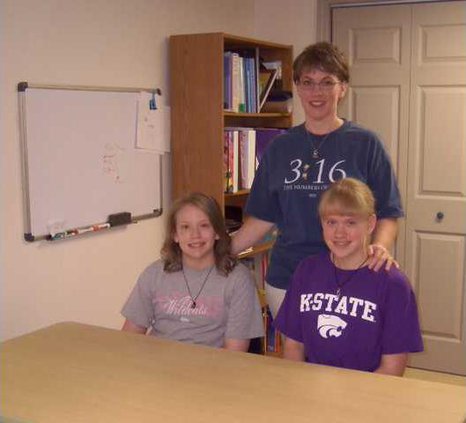Alicia Straub is thankful she overheard the conversation that day in Pizza Hut.
“I thought ‘What is she talking about?” said Straub. “I stopped her before she left.”
The woman, who Straub knew and who worked for a preschool, had been talking about a relatively new concept at that time – virtual public school. Straub’s oldest daughter, Alexa, was a toddler – she’s now 9 – and had caught the attention of her pediatrician.
“She was speaking very well at a year old. The doctor said, you need to think about what you’re going to do to challenge her,” Straub said.
Straub and her husband, Will, of Ellinwood, were living in a highly populated area in Pennsylvania and didn’t want to send Alexa to public school there. Private school was too expensive, so public school from home was their answer. In Kansas, they use Lawrence Virtual School which is accredited, follows Kansas public school curriculum rules and offers the support of teachers they employ.
Several local families cited a variety of reasons for deciding to keep their child’s education in the home, whether through traditional home schooling in which a parent prepares lesson plans, teaches and grades, or through virtual public school in which the curriculum, lesson plans and grading is done via an online school and the parent serves as “learning coach.”
For Selena Riddle and husband, Chris, of Great Bend, when they adopted their first child, they felt a deep sense of responsibility.
“When it was time for Chloe to start school, we felt obligated to do the best for her, and, for us, that was home schooling,” Selena Riddle said. “That has been confirmed many times over.”
Riddle is the informal leader of Golden Belt Home Educators, a group that includes at least 15 families in Barton and neighboring counties. The group has a parents night out twice a month, a monthly field trip to places like Cheyenne Bottoms, Fort Larned, a brick factory, etc., and an e-mail list for support and information.
In addition to her oldest - a sixth grader - Riddle also teaches her 9-year-old fourth grader and 7-year-old second grader.
One of the main benefits, Riddle said, is the ability to tailor lessons to each child’s learning style and strengths.
“Chloe is incredibly strong in spelling and language arts. We’re able to let these areas flourish,” she said. “Michael has attention issues, so he’s able to do hands-on kinesthetic learning. Josie is an extremely visual learner and extremely not a verbal learner. A classroom would kill her.”
Prior to the decision to educate at home, Riddle worked as an occupational therapist in the school system.
The annual Teaching Parent’s Association conference in Wichita, held the first weekend each June, is a good place to get home schooling information, said Kim Eckels, former leader of Golden Belt Home Educators and teacher to her two daughters, Emily, 13, and Grace, 11.
“I was completely overwhelmed at first,” Eckels said. “There’s so much out there. The expo hall is filled.”
Grace Eckels said she enjoys the one-on-one attention she gets from her mother as a teacher.
“If I was in a classroom with a bunch of other kids, I’d be a teacher hog,” she said. “Now I just say, ‘Mom, I need help.’”
She also enjoys the flexibility to visit her dad, Will, for lunch in Hoisington.
Kim – who worked in accounting previously – echoed Riddle’s point about learning styles.
“My girls have very different learning styles and interests. They’re night and day,” she said. “Sometimes it’s been challenging. Things that work for one don’t always work for the other.”
The Eckels’ day starts out with chores in the morning, then history, Bible, reading and music. The afternoon is reserved for more independent work such as math and science, and musical pursuits.
Socialization with other kids is a challenge home school families face. For the Eckels, that comes through church groups and recreation commission classes. The lack of organized sports is also a challenge, and some families have moved to larger communities to continue home schooling but also involved their kids in competitive sports.
Another challenge is staying on task, Eckels said.
“Staying disciplined is hard. We really try to keep school time, school time,” she said.
For single mom, Kelli Anderson, who works full time and homeschools her 11-year-old son, Isaac, being able to tailor Isaac’s curriculum was important.
“I liked the Biblical aspect you could do,” she said. “I also like the flexibility for vacation and work.”
Anderson, a pharmacist at Walgreens, works for eight days, then has six off, a schedule that allows her to teach her son.
“We’re definitely learning how we need to interact with each other,” she said. “He learns different than I can teach. But it’s totally worth it in the end. We know each other very well. We’re a close-knit, tight family unit.”
Straub – who works part time as an apparel merchandiser – also likes the fact that her daughters don’t have to move forward with a topic until they truly understand it.
“It’s mastery-based,” she said. “They can work at their own pace.”
She does admit, however, that whether it’s traditional home schooling or virtual public school, the path is a unique one that doesn’t work for every situation.
“I’m the first person to say that it’s not for everyone,” she said. “You have to really want to educate your children at home. You have to be 100 percent into it or it won’t work.”
Riddle agrees.
“It’s not a competition,” she said. “Public, private, hom eschool. It’s whatever works best for that family.”
School at home
Local families have various reasons for choice





